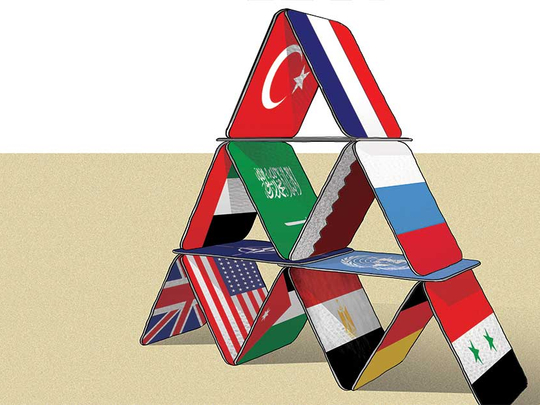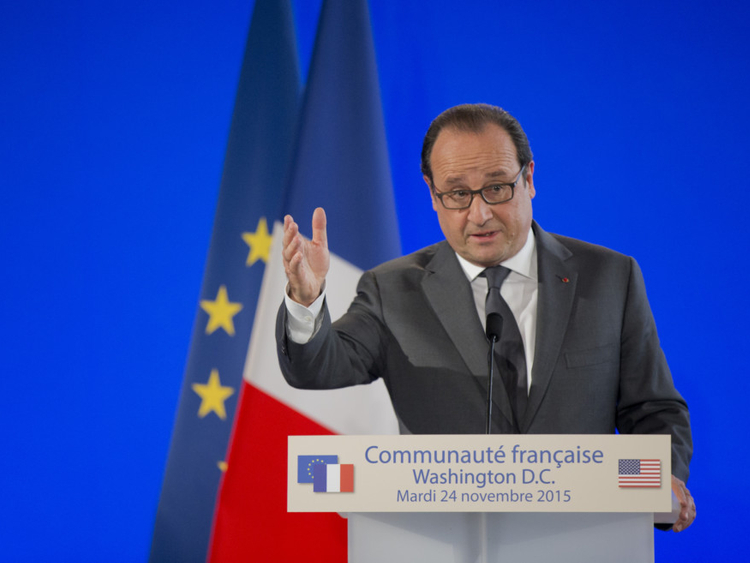
Despite a much reinvigorated international alliance against Daesh (the self-proclaimed Islamic State of Iraq and the Levant) it is hard to see much change in the grand strategy that has left Dash in charge of large parts of Syria and Iraq and allowed it to export its violence and mayhem to great effect.
The immediate cause of the new sense of action is French President Francois Hollande’s diplomatic initiative following the appalling assaults in Paris that left 130 people dead and hundreds more injured. He spoke first to his allies — British Prime Minister David Cameron, United States President Barack Obama and German Chancellor Angela Merkel — before moving on to meet the new entrant into Syrian, Russian President Vladimir Putin, and was then due to touch base with the Chinese as well.
Hollande faces two real challenges in restarting the international alliance against Daesh. The first is that no international power wants to put its own troops on the ground to fight a long war in Syria and Iraq, but the problem is that Daesh cannot be defeated by bombing raids and drone strikes.
Eventually, troops have to move in on the ground and fight it out field by field, house by house. But last Tuesday, Hollande said that France would not deploy ground troops in Syria, which seemed to make clear that he accepts Obama’s position against ground incursions. That means that the troops on the ground will have to be Syrian opposition troops and there are not many of them outside the unacceptable religious groups of Jabhat Al Nusra.
The second problem is that any action against Daesh must have a political plan, for who will take authority over the liberated territories and their six million inhabitants in both Iraq and Syria. This means that before they start any new action, the allies need to agree on two very different strategies to restore order.
Little credibility
In Iraq, they will have to work with the local leaders to form a new regional government that can then work with the central government in Baghdad. In Syria they have said that they will back an interim regime, which will then guide the country back to a new government as defined by the Geneva process. This may sound sensible, but the problems are very deep: Iraq’s government remains determinedly sectarian and fails to attract the loyalty of many Iraqis in the west of the country; and Syrian President Bashar Al Assad’s remnant regime in Damascus has very little credibility left and even its army requires massive bolstering by the Lebanese militia Hezbollah, Iranian forces and now the Russians.
This is why talks to reinforce the Syrian opposition are so important because this is where future partners in a new Syrian government should come from. This is why US Secretary of State John Kerry was in Abu Dhabi this week to talk to His Highness Shaikh Mohammad Bin Zayed Al Nahyan, Crown Prince of Abu Dhabi and Deputy Supreme Commander of the UAE Armed Forces, and they both met the dynamic Saudi Foreign Minister Adel Al Jubair, whose government has taken the lead on re-assembling a coalition of opposition exile groups and armed factions.
The secular opposition has not had a very successful record, but it is possible that it can restart given the new goodwill of the entire international community to help it make some headway. Particularly since the only other options are to surrender the country to religious extremists, or hand it back to Al Assad, so there will be considerable new momentum to help the opposition, which has been missing for the past few years.
But this task of rebuilding the opposition has been made much more difficult by the shift in the international environment after a Russian warplane was shot down by Turkish forces. Putin did not hesitate to use grossly inflammatory accusations against the Turks when he said that the attack was “a stab in the back delivered by terrorists’ accomplices. [The plane] was flying one kilometre away from Turkish territory”.
Putin added that “we have long been recording the movement of a large quantity of oil and petroleum products to Turkey from [Daesh]-occupied territories. This explains the significant funding the terrorists are receiving. Now they are stabbing us in the back by hitting our planes that are fighting terrorism. We will of course carefully analyse what has happened and today’s tragic event will have significant consequences for Russian-Turkish relations.”
This means that the necessary support of Turkey as the nearest base from which to launch opposition operations has become very controversial in the context of the global geopolitical struggle being fought out on the plains of Syria.
Nonetheless, all players have to recognise that only Syrians can govern Syria in the end. Iranian and Russian support for the regime and international support for the opposition can only go so for. This is why the Arab efforts to rebuild the opposition are so important.










